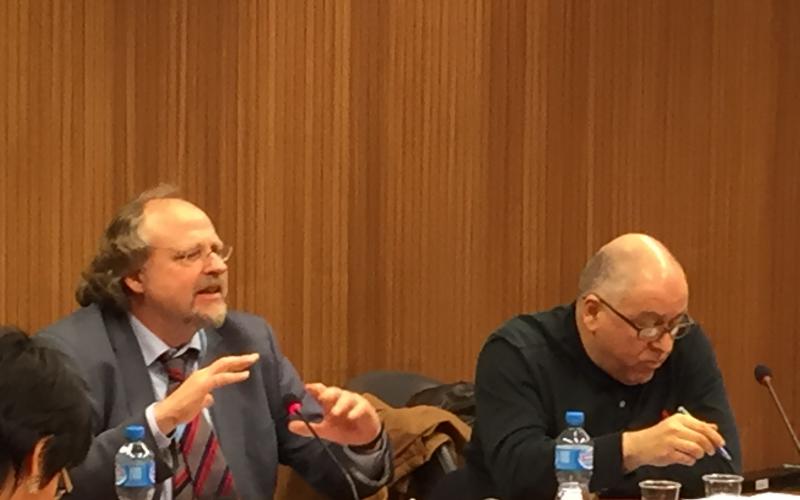The event, held 7 March 2016, was co-organized by Amnesty International, the International Federation for Human Rights and the Baha’i International Community as a parallel event at the 31st session of the Human Rights Council in Geneva.
It began with a screening of “Iranian Revolutionary Justice,” an hour-long documentary that explores the functioning and impact of revolutionary courts in Iran after the 1979 Islamic Revolution. Among other things, it focuses on the fate of individuals from persecuted groups – including the Baha’is – at the time. It features interviews with family members and a never-before-seen footage of the trial of a group of Baha’i leaders.
Heiner Bielefeldt, the UN Special Rapporteur on freedom of religion or belief, was the first to speak, saying that the film conveyed that Iran has “one of the most atrocious human rights records” in the world today, in part because of the justice system established after the 1979 Revolution.
“Iran is a very admirable society, a very dynamic society, so it is all the more paradoxical to see such a travesty of justice, such a dictatorship, installed in a society which has an enormous potential for democracy,” said Dr. Bielefeldt.
“The justice system does not just suffer from shortcomings. It is a deliberate perversion of the entire system and that continues to this very day,” he said.
One of the groups that has suffered the most under this system, Dr. Bielefeldt said, is the Iranian Baha’i community, who he said are currently the “most persecuted group in Iran.”
“You will find in all areas of life, there is a systematic discrimination against the Baha’is,” he said. “It starts with kindergarten. Kindergarten staff are supposed to spot Baha’is so they can be under special surveillance.”
The persecution of Baha’is continues in elementary school and high school, he continued. “It would continue in higher education but Baha’is are banned from university, and those Baha’is who are discovered are removed.”
Once in the workplace, Baha’is also face discrimination, he said. They are banned from public employment and their private sector businesses face boycott or closure. Even after death, he said, the persecution does not end, noting that many Baha’i cemeteries have been desecrated.
Karim Lahidji, president of the FIDH (International Federation for Human Rights) said he was deeply moved by the film since he knew personally several persons whose stories it depicted.
“The Islamic Republic of Iran does not uphold the rule of law,” he said, saying that the courts described in the film are not found in the Constitution. “These revolutionary justice tribunals are therefore unconstitutional,” he said, noting that they continue to exist today.
The film’s producer, Behrooz Afagh, head of journalism for the BBC World Service for the Near East, West and Central Asia, spoke last. He said that the concept of “revolutionary courts” in Iran has undergone several phases since the 1980s, from the outright execution of officials of the regime of the Shah and Baha’is to the imprisonment of member of the Green Movement after the 2009 presidential election.
“The thread that turns through [all phases] is that the trials are essentially show trials, and the authorities have a single narrative, which is that the defendants are agents of foreign countries and acting on their behalf,” said Mr. Afgah.
In the case of the eight Baha’is, the footage ends before the conclusion of the trial and it is not known whether their sentence was pronounced in court. However, according to the verdict, all eight Baha’is were sentenced to death as well as the subsequent confiscation of their properties. They were executed on the same day as the trial.
“It is quite ironic that it has taken an Islamic regime and an indiscriminate justice system to help many Iranian recognize all their misconceptions about Baha’is and to see Baha’is as fellow citizens,” said Mr. Afagh.
A video of the panel discussion can be viewed here.

March 16, 2016 4:48 am
The Ottoman authorities put the founder of the Baha’i Faith, His Holiness Baha’ullah in prison in Palestine over 150 years ago. So, our Holy place, happens to be in Israel. It is noteworthy that while they call Baha’i’s spies of Israel, if they recant their religion, then can go free! The member of the Baha’i Faith live virtually in every country around the world. They have proven their peace loving attitude beyond a shadow of a doubt for over a century! I am hoping that you raise your voice in their defense to your representatives soon. Only public awareness and their power can give freedom to Iranian Baha’i’s!